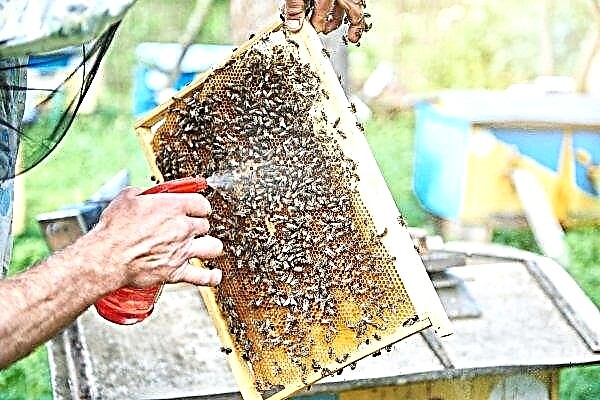Pigeons are not only a threat to buildings (their droppings destroy plaster), they can also be a source of infections for people. In many cases, this leads to serious consequences. This article describes possible diseases, whether they are dangerous, their symptoms and treatment.
What infections doves carry?
Zoonotic infections are diseases that can be infected as a result of contact with a sick animal. Among the carriers of different infections there are pigeons. The reason is that their droppings, feathers and nests are an ideal habitat and breeding of bacteria, viruses and fungi. Diseases that spread pigeons are many and without timely treatment they are extremely dangerous for humans.
Important! If you find any manifestations of any of the diseases described below, immediately seek medical help.
Psittacosis
Pittacosis (also ornithosis) is a disease caused by the microorganism Chlamydia psittaci. You can become infected with it even without direct contact with the pigeon, it spreads by airborne droplets and enters the human body when you inhale air containing microparticles of dry droppings. The disease is also transmitted from person to person. The disease affects the internal organs, usually the lungs, but sometimes also the heart, liver and organs of the central nervous system. Infection with ornithosis can confuse the disease with normal flu, because the initial symptoms are very similar.
The disease affects the internal organs, usually the lungs, but sometimes also the heart, liver and organs of the central nervous system. Infection with ornithosis can confuse the disease with normal flu, because the initial symptoms are very similar.
Symptoms
- fever;
- chills;
- increased fatigue;
- muscle pain;
- sensitivity to light;
- nausea and vomiting;
- nosebleeds;
- later a dry, painful cough develops, often with expectoration of blood;
- chest pain.
Important! If untreated, ornithosis can be fatal.
Etiotropic drugs will help to overcome the disease in a fairly short time:
- azithromycin;
- erythromycin.
Tetracycline antibiotics may be used. You can stop treatment only after complete recovery. They also use detoxification therapy, ascribe bronchodilators, vitamins, symptomatic substances, but only as adjuvants.
Salmonellosis
Birds also carry such an unpleasant disease as salmonellosis. Salmonella bacteria live mainly in bird droppings. Symptoms of infection develop after 12-24 hours of contact with droppings.
Manifestations:
- abdominal pain;
- severe diarrhea;
- active vomiting;
- cardiopalmus;
- fever.
The risk increases for:
- children
- people with immunodeficiency;
- elderly people.

Treatment:
- The first few days after the onset of symptoms, it is necessary to wash the gastrointestinal tract.
- Sorbents that remove toxins are used.
- Detoxification therapy is used.
- Enzyme medications are used to aid digestion.
Campylobacteriosis
Campylobacteriosis is a disease caused by the Campylobacter bacterium that lives in the digestive tract of various animals:
- domestic or wild birds;
- cattle;
- pigs;
- dogs
- cats
- other mammals.
Did you know? Campylobacteriosis affects representatives of any age group, but especially often residents of cities older than 50 years.
Infection occurs through:
- consumption of raw or undercooked infected meat, mainly poultry (50–70% of cases);
- direct contact with a person or an infected animal.

The incubation period lasts from 5 to 14 days. During this period, the following symptoms may occur:
- general weakness;
- fever;
- increased fatigue;
- bloody diarrhea;
- stomach pains;
- nausea and vomiting.
These manifestations usually disappear on their own in 3–6 days. If the malaise lasts longer than a week, specialized treatment is prescribed. The main objective of the patient is to fill the lack of fluid.
Antibiotic therapy is intended for patients with immunodeficiency or in general serious condition. In this case, use:
- erythromycin;
- azithromycin.
Infectious Listeriosis
Listeriosis is a bacterial infection caused by the Listeria bacterium. The disease affects people with immature or impaired immunity. Risk groups include:
Risk groups include:
- newborns;
- pregnant women;
- old people;
- patients after organ transplantation;
- patients with cancer, cirrhosis of the liver;
- persons undergoing immunosuppressive treatment.
The most common symptoms are:
- heat;
- joint and muscle pain;
- vomiting
- diarrhea;
- convulsions;
- temporary loss of consciousness.
Listeriosis not detected in time can lead to:
- meningitis;
- endocarditis;
- sepsis.

Newcastle disease
Newcastle disease is one of the most popular diseases among birds. You can get infected through contact with sick individuals. The incubation period is from 3 to 6 days.
Manifestations:
- depression;
- difficulty breathing;
- hoarseness;
- runny nose;
- fever;
- eye itch.
Toxoplasmosis
Toxoplasmosis is a zoonotic disease, especially dangerous for pregnant women: it can harm the fetus and subsequently lead to miscarriage. Toxoplasmosis is one of the most common infections of a parasitic nature. Not all infected people may have symptoms of the disease, some are carriers only. Manifestations of the disease:
Manifestations of the disease:
- fever;
- flu symptoms
- enlarged lymph nodes;
- joint discomfort;
- inflammation of the affected organs;
- sometimes encephalitis and meningitis.
Pseudotuberculosis
Pseudotuberculosis is caused by bacteria of the genus Yersinia enterocolitica. It is considered a rather dangerous ailment. Symptoms:
- abdominal pain (often reminiscent of pain caused by appendicitis, that is, felt in the right lower abdomen);
- diarrhea;
- nausea;
- fever;
- rash;
- muscle and joint pain;
- vomiting
 At elevated body temperature, antipyretic and anti-inflammatory drugs are attributed to the patient. In especially severe cases, antibiotic therapy is recommended, although the disease usually goes away after a few days of a proper diet.
At elevated body temperature, antipyretic and anti-inflammatory drugs are attributed to the patient. In especially severe cases, antibiotic therapy is recommended, although the disease usually goes away after a few days of a proper diet.Tularemia
Tularemia is an acute infectious disease. There are various forms of this disease arising from different pathways of infection. Some of these forms can develop very quickly and even lead to death, especially if the disease was not diagnosed on time.
Did you know? The pigeon has long been considered a symbol of peace. It is captured in the form of monuments in more than 30 cities of the planet.
The main manifestations are the appearance of erythematous papules, which within 48 hours increase to 1-2 cm and turn into pustules, and later - into small ulcers. After some time, flu symptoms are added, such as:
- chills;
- fever;
- headaches and muscle aches.
In the case of diagnosing tularemia, antibiotics are prescribed:
- aminoglycosides;
- tetracyclines;
- chloramphenicol.
Your doctor may also prescribe other medicines, such as:
- gentamicin;
- netilmicin.

How to protect yourself from diseases?
A few simple rules will help you prevent infection by infections that can be transmitted through contact with the pigeon.
- Always wash your hands after contact with animals, before cooking, before eating, after each contact with the ground.
- Use gloves when working in the garden or in the garden.
- Wash vegetables and fruits thoroughly before eating.
- Protect food from insects.
- Periodic medical examinations and tests are recommended.
In conclusion, it should be emphasized that birds can be carriers of dangerous diseases, but they can be easily avoided simply by following personal hygiene rules.












